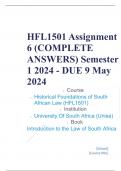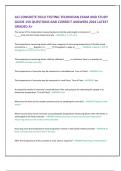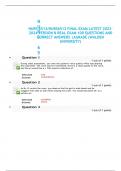Exam (elaborations)
HFL1501 Assignment 6 (COMPLETE ANSWERS) Semester 1 2024 - DUE 9 May 2024 • Course • Historical Foundations of South African Law (HFL1501) • Institution • University Of South Africa (Unisa) • Book • Introduction to the Law of South Africa HFL1501 Assignmen
HFL1501 Assignment 6 (COMPLETE ANSWERS) Semester 1 2024 - DUE 9 May 2024 • Course • Historical Foundations of South African Law (HFL1501) • Institution • University Of South Africa (Unisa) • Book • Introduction to the Law of South Africa HFL1501 Assignment 6 (COMPLETE ANSWERS) Se...
[Show more]












